The Black Lives Matter movement has seen sportspeople from across the world and in Australia speak candidly about their experiences of racism. It's what's spurred on former Collingwood football player Chris Egan to speak up.
Egan played for Collingwood in the AFL between 2005 to 2008 and now works with the Aboriginal Justice Panel in Victoria. He has had a history of dealing with racism in Aussie Rules, particularly among crowds.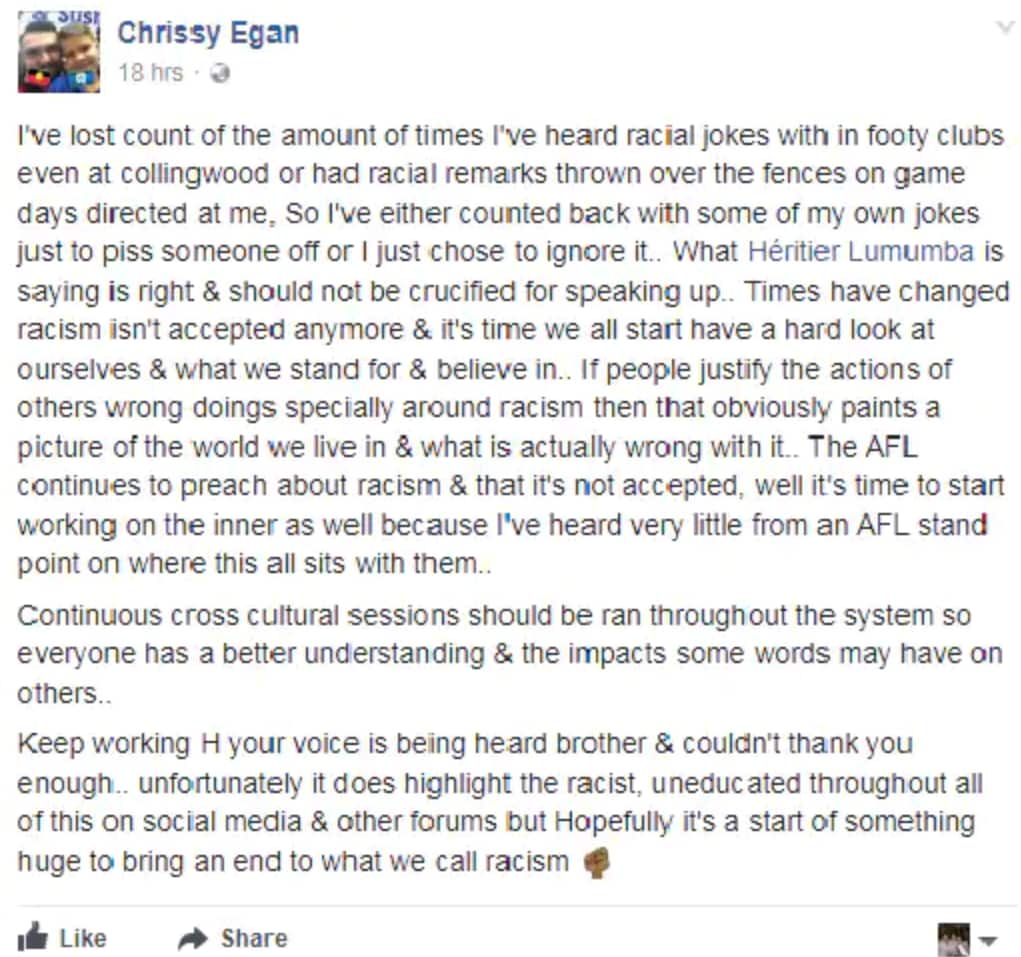 Speaking exclusively to The Feed, Egan explained the length and breadth of his experiences with racist taunts from the crowd: from being called a 'boong' by a spectator when he was only 15, to dealing with being labelled a 'black dog' during his days as a professional.
Speaking exclusively to The Feed, Egan explained the length and breadth of his experiences with racist taunts from the crowd: from being called a 'boong' by a spectator when he was only 15, to dealing with being labelled a 'black dog' during his days as a professional.

Chris Egan briefly mentioning allegedly having racial remarks directed at him from crowds in 2017. Source: Chris Egan/Facebook
Over the last few months, he has been revisiting these memories, especially as a father. It's what brought him to this moment and compelled him to speak.
"There's an unfortunate history with you know, racial crowd abuse at Collingwood games and AFL games," Egan told The Feed.
"I go to Collingwood games, I take my son, and I don't want him to ever be exposed to it."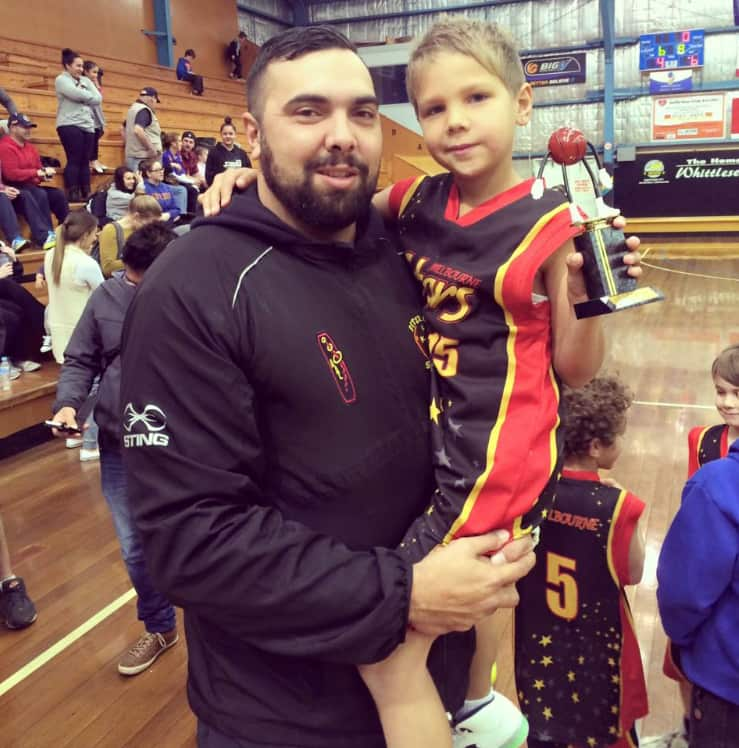 It's an experience that took a huge toll on Adam Goodes, as detailed in recent documentaries.
It's an experience that took a huge toll on Adam Goodes, as detailed in recent documentaries.

Chris Egan holding his young son after he won a basketball grand final. Source: Supplied
And it's something that has come into the sporting spotlight only this weekend. In the NRL's Friday night clash, Panther's player Brent Naden called out alleged racial abuse by a spectator during the game, and eight fans were removed from the Central Coast Stadium by police and security as a result.
On this occasion, on-air commentators were quick to condemn the behaviour and the NRL acting CEO Andrew Abdo has vowed to take "the strongest possible action the game can take against those individuals," if allegations are proven to be of a racial or vilification nature.
'What was going to be a great day as a Carlton supporter back then got tarnished pretty quick'
For Chris, experiences of racism at the football began when he was only a child.
In the late 90s, a primary school-aged Chris Egan was walking to the MCG, to watch his very first AFL game. His parents and cousin were with him to see his beloved Carlton go up against Nicky Winmar's St Kilda.
"I remember it clear as day," Egan told The Feed.
The game was on edge and Egan remembers watching Winmar getting into a few little "scuffles with Carlton players -- it was an emotionally intense game."
As Winmar was trading barbs on the footy field, Egan remembers a man sitting a few rows in front of him and his family, not too happy with Winmar's behaviour.
"[He] shouted, 'put your head in Nicky you fucking n****r cunt'," Egan said.
Winmar was no stranger to receiving racial abuse from the sidelines, it's what spurred him years earlier in 1993 to lift up his shirt and point to his black skin -- as a point of pride.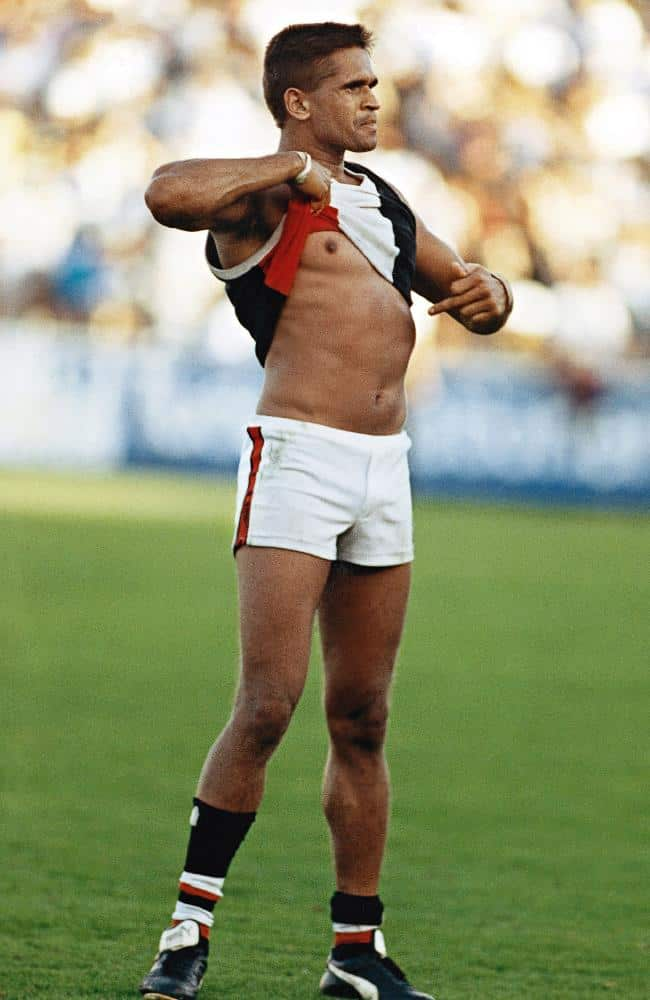 More than two decades later, it's a moment Egan still thinks about today.
More than two decades later, it's a moment Egan still thinks about today.

Nicky Winmar making his famous stand against racism in 1993 at Victoria Park. Source: Wayne Ludbey - The Age/National Museum of Australia
"What was going to be a great day as a Carlton supporter back then got tarnished pretty quick," Egan said.
"And it was only within the first half of the game."
Looking back, Egan recalls not understanding the racial slur but knew it was wrong. Like any child who is struggling to make sense of something, he turned over to his parents.
"To see my mum and dad's reaction, my mum especially," he said.
"My mum's non-Indigenous, she's a white lady. And she was very disappointed and angry. My mum goes a bit red faced when she's angry."
'At the time there was no security or anyone that we could tell'
In 2001, the then 15 year-old Egan was selected to play in a Victorian team that was going up against a side from the Northern Territory at the MCG.
Egan was thrilled.
"That's where you want to play because it's the Mecca of football," he said.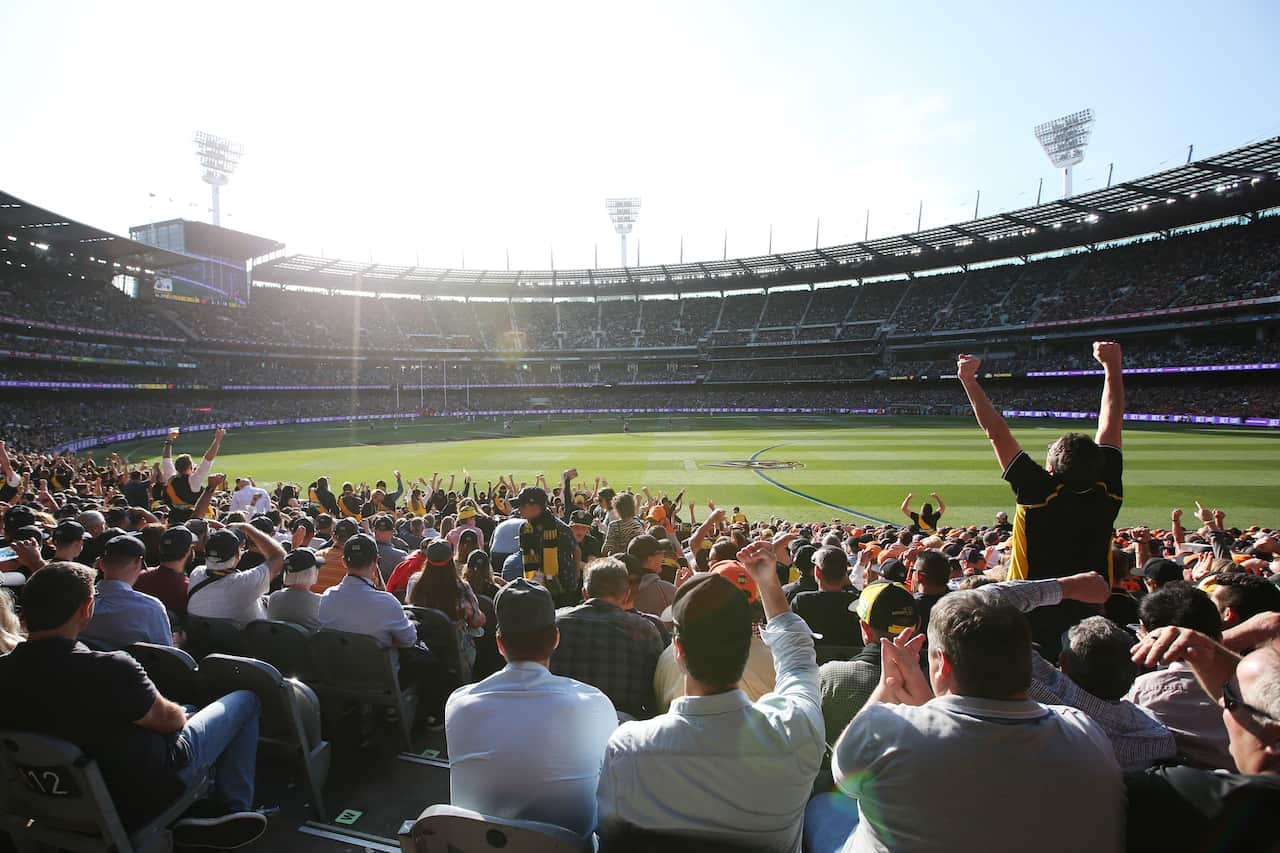 The competing teams were playing a curtain-raiser before Collingwood and St Kilda kicked off.
The competing teams were playing a curtain-raiser before Collingwood and St Kilda kicked off.

A crowd of people at the MCG. Source: AAP
The crowd was sparse, it was an early start and the stadium hadn't started to fill up yet.
When running toward the 'cheer squad', Egan heard a voice.
"I remember it pretty clear it was like 'Oh, here we are, there are little Boongs playing around here today'," he said.
Egan's cousin kicked the footy in his hands at the person who shouted the racial slur.
"At the time there was no security or anyone that we could tell," Egan said.
Egan says he "kind of pushed" the incident to the side. There wasn't enough time to process the alleged racial abuse -- there was a game to be played.
"At the time, it hurt us, we felt pretty shitty about it. But at the same time, we were also over the moon because we're the ones out there on the G having a kick," he said.
'Is he saying it because he thinks generally that's where black people belong?'
The 2005 season was Egan's first in the AFL, and he was still having issues with crowds in the stadium -- this time it was at the Etihad Stadium, formerly the Telstra Dome. Collingwood were up against St Kilda, Egan was near the boundary line running with the ball near the broadcast side of the stadium.
"All I hear is like, 'piss off back to jail Egan'," he said.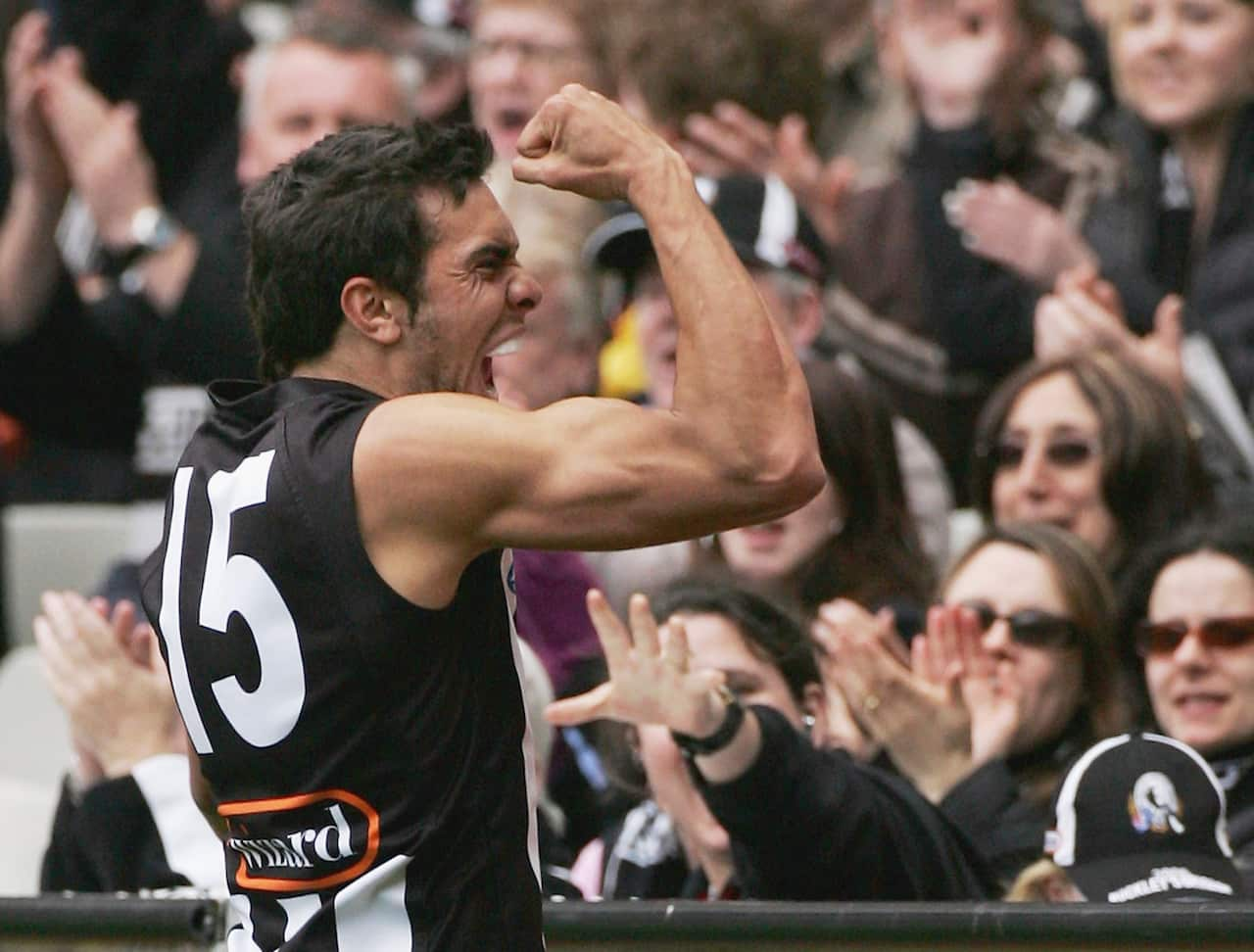 At the time, he laughed it off and thought it was immature but he didn't think much of it. Again, he had a game to finish, it was his debut season -- there wasn't time to dwell.
At the time, he laughed it off and thought it was immature but he didn't think much of it. Again, he had a game to finish, it was his debut season -- there wasn't time to dwell.

Chris Egan celebrates a goal at the Melbourne Cricket Ground in September 3, 2006. Source: Getty Images AsiaPac/Hamish Blair
"But now I look at it and think: where does that come from? How does he perceive me?" Egan asked.
"Is he saying it because he thinks generally that's where black people belong?"
"Around 10 to 20 rows back all you hear is, 'you're a dog Egan, you black dog'"
That wasn't the last time Egan would hear something from "over the fence", as he calls it. Another time it was an interstate game in Adelaide, he was stumbling over the boundary line with one of the opposition players -- and it happened again.
"Around 10 to 20 rows back all you hear is, 'you're a dog Egan, you black dog,'" he said.
"Like, I did nothing," Egan said, "You know, those sort of things, they're really disappointing."
Egan didn't tell anyone at Collingwood or the AFL about his experiences -- it had become normal for him.
"Because I faced this couple times, even prior to me playing in AFL football, I kinda just let it go," he said.
Egan played 27 games for Collingwood and was delisted by the club in 2008. He later went on to play for Echuca Football Club in the Goulburn Valley League in 2010.
He hit the headlines that year when he was arrested for over $25,000 worth of unpaid toll fines. However, Collingwood president Eddie McGuire stepped in to help and paid part of the outstanding amount, after a plea from Egan's cousin, former Essendon footballer Nathan Lovett-Murray.
“Everyone needs a chance to clean the slate and start again," McGuire told The Herald Sun.
What would have made a difference to Chris?
During his career, Egan believed there were cultural knowledge gaps that needed to be filled at Collingwood, and broadly at the AFL.
He regularly visited the club psychiatrist who he "loved" to discuss his personal life and performance.
But there were always things he felt he couldn't say.
"I don't think they would have understood," he said.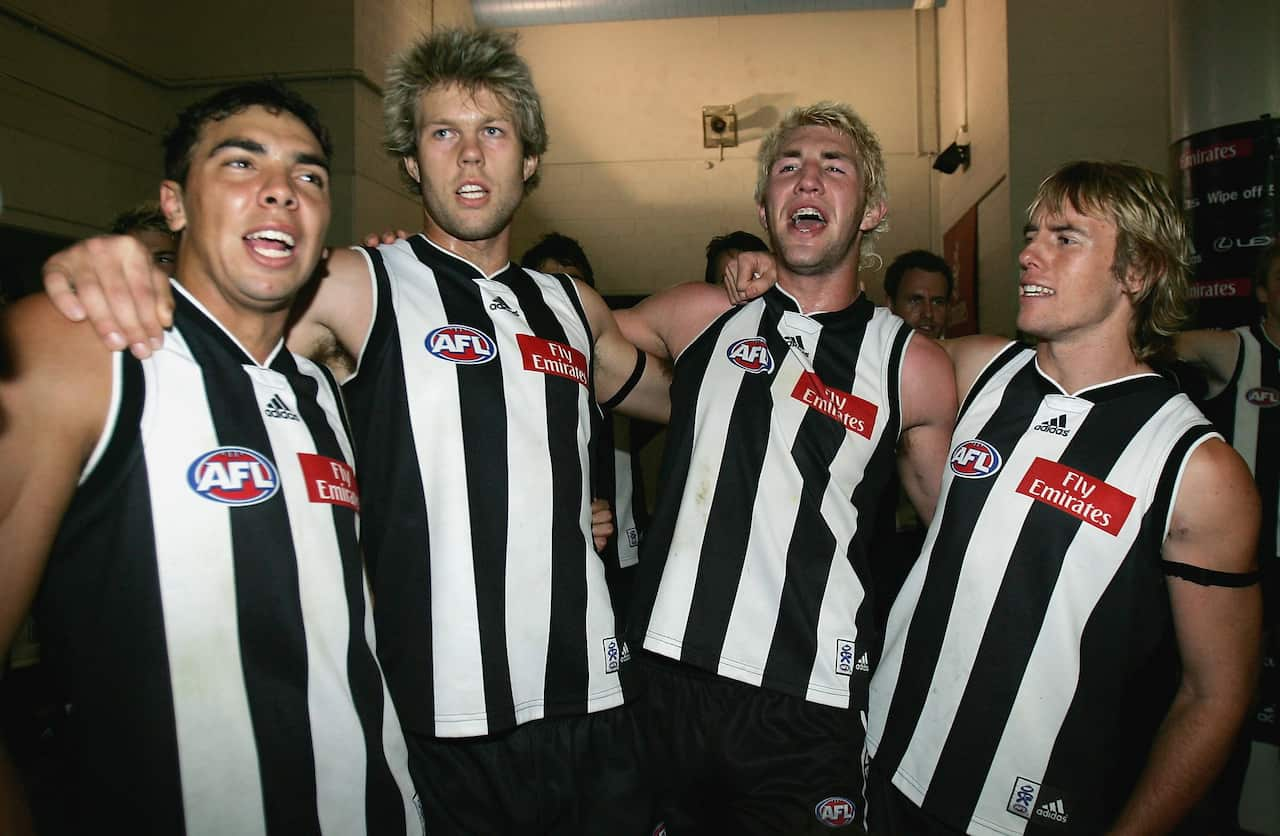 Despite having a good working relationship with his coach Mick Malthouse, and his other teammates, he felt there was a shortage of people at the club with firsthand experience of being Indigenous or facing racial abuse.
Despite having a good working relationship with his coach Mick Malthouse, and his other teammates, he felt there was a shortage of people at the club with firsthand experience of being Indigenous or facing racial abuse.

Chris Egan, David Fanning, Travis Cloke and Ben Davies celebrate. Source: Getty Images AsiaPac/Ryan Pierse
"They see things different to us. And that's not in a negative way," he said.
Egan was in his early 20s while he was playing, and "growing up being racially slurred" -- he didn't know if it was something that needed vocalising.
He believes an Indigenous mentor or well-being officer within the club could have helped him express himself.
"Not that I was afraid to say anything back then...because of the environments that I was in I just kept plugging, plugging away," he said.
"Maybe I should have brought it up. And maybe if I did have someone that I could definitely depend on from a cultural aspect within the club, I definitely would have said something."
It’s a measure that has been introduced for some players in the AFL. Now, at least ten out of the 18 clubs in the AFL have an Indigenous liaison officer in some form, which is outlined in the AFL Players Association’s best practice guide, while all clubs have “dedicated support staff in player welfare.”
An AFL spokesperson explained to The Feed the role of welfare officers at clubs is, “to ensure the players feel included, safe, and ultimately have a positive experience throughout their tenure at their respective clubs.”
“If any player, at any level of the game has been subject to vilification and not had the positive experience in football that we wish for all players to have, our commitment to you is to ensure we do everything in our power to support you, and prevent further incidents,” an AFL spokesperson said.
Creating initiatives to deal with racism within the sport is not new for the AFL. In 1995, the competition introduced a rule called ‘Discrimination and Racial and Religious Vilification’, which has been updated over the years and made it an offence for any player or official to vilify someone on the basis of race, religion, ethnicity or background, with a fine of up $50,000 for any club found to vilify someone on these grounds.
But this didn’t extend to spectators. As for their behaviour, under the AFL’s Condition of Entry into venues, fans are not to engage in conduct any behaviour that threatens, offends, insults or vilifies on the basis of a person’s race, religion, colour, descent or ethnic origin, special ability/disability or sexual orientation, preference or identity.
“The AFL has the power to eject patrons and suspend memberships if someone is determined to have breached the code of conduct for entry to matches, which includes racist and demonstrative taunts towards other fans, players or officials,” an AFL spokesperson said.
“There are anti-social hotlines available at every venue for fans to report such behaviour.”
Following allegations of racism within the club by former player Heritier Lumumba, Collingwood announced on June 22 an integrity committee would investigate his claims. The process is ongoing, and has been broadened to review the club culture between 2005 to 2014. Eualeyai/Kamillaroi woman, Professor Larrisa Behrendt is leading the investigation.
‘For too long racism has plagued our game’
The AFL Players Association has also taken steps. They decided in 2019 to alter their strategy after consultation with Indigenous players at that year’s Indigenous player’s camp, which has been running every two years since 2000.
It was a drastic change. Previously the strategy involved asking the player who received the racial abuse for permission, which placed the onus on the player. Now the AFLPA has a blanket rule, if they are aware of any racist abuse online or in the crowds they will call it out.
The AFLPA also reports all incidents of racial abuse they are aware of to the AFL integrity department.
Throughout the last decade, the players union has adopted several strategies to address racism in games. They’ve run sessions with the media to curb casual racism slipping through in their coverage; they’ve used its player development funding to include the hiring of an Indigenous liaison officer at AFL clubs; and the AFLPA has had a designated Indigenous relationships manager role to aid Indigenous player welfare for the last 14 years. An Indigenous Advisory Board was instituted in 2011.
A spokesperson from the AFLPA said in a statement that Indigenous players have had to deal with racist behaviour over long periods of time.
“For too long, racism has plagued our game and Indigenous players are often the target,” a spokesperson told The Feed.
“The AFLPA has supported a number of players who have experienced this and will continue to do so, including publicly calling out racism on their behalf as it arises.”
‘We might wear the mighty black and white, but we're still black in their eyes. And they still think they’re more superior to us’
While initiatives in this area have begun, Egan is fed up. The political moment around the Black Lives Matter campaign has pushed him to speak in detail about his experiences playing in the AFL. He says he is “more awake” to what he’s experienced, and “everything that's been going on in the world” has forced him to make a stand.
“The Indigenous players that played at the club whether you're Aboriginal like me, or Brazilian like Heritier. At the end of the day, we might wear the mighty black and white, but we're still black in their eyes,” he said, in reference to some Collingwood fans.
“And they still think they’re more superior to us and they can just do whatever they want and us to not retaliate.
“Like we're taking a stand and we're not taking it no more. It's a problem throughout the AFL.”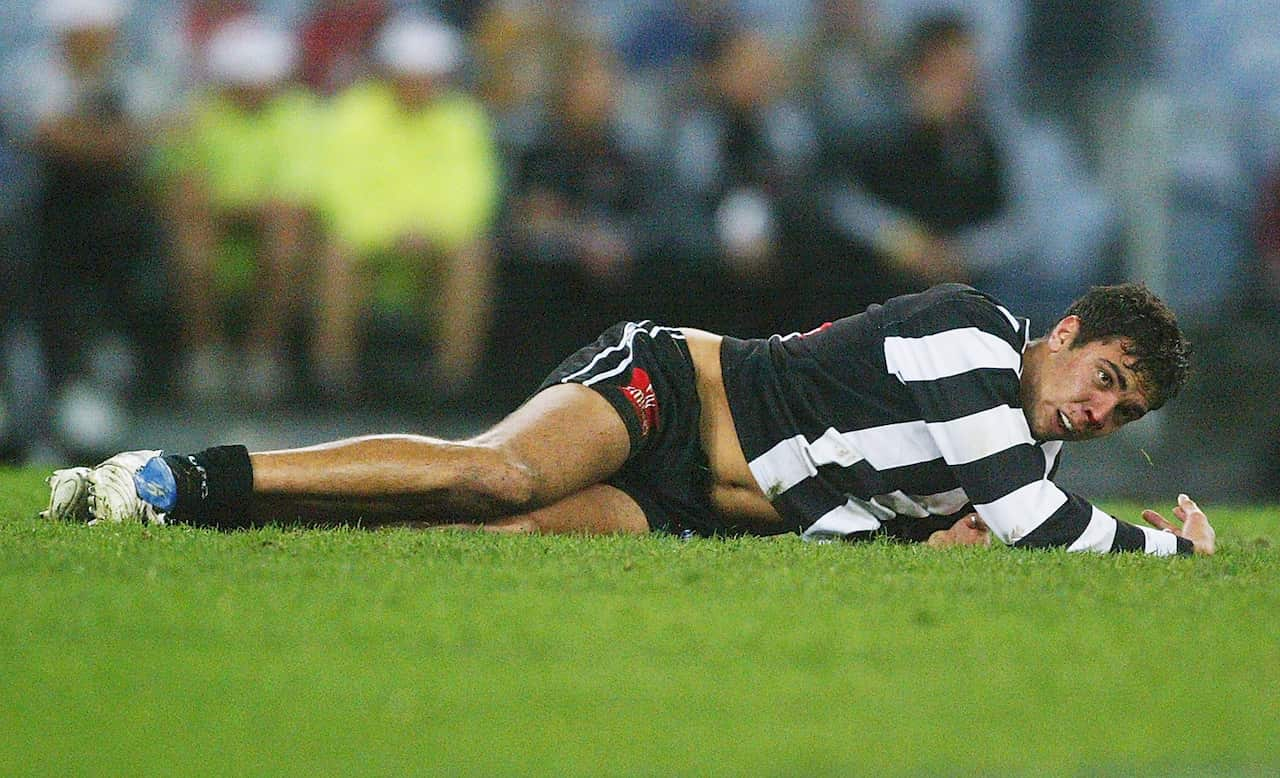 Egan says there have been improvements since he left the game over a decade ago, and highlighted the work his cousin Leon Egan, the former Indigenous and Multicultural Relationship Manager at the AFL Players’ Association, has done in the AFL in relation to cultural awareness.
Egan says there have been improvements since he left the game over a decade ago, and highlighted the work his cousin Leon Egan, the former Indigenous and Multicultural Relationship Manager at the AFL Players’ Association, has done in the AFL in relation to cultural awareness.

Chris Egan lies on the ground injured during the round 13 AFL match between the Sydney Swans and the Collingwood in 2005. Source: Getty Images AsiaPac/Mark Kolbe
“Clubs have done better to identify culturally the importance of Indigenous players or people,” he said.
However, Egan wants to see more actions taken towards crowd members who perpetrate racist abuse, and he’s called for “criminal charges” to be laid at those found responsible.
In the wake of the abuse reported in the NRL in Friday nights’ game, Panthers player Brent Naden has been reported to be considering an official complaint to police.
Former Australian cricket captain Mark Taylor suggested spectators found to have made racist comments be compelled to undergo compulsory education. He said on Sunday, “you want to go back to the NRL or any sporting event, you’ve got to go do a class. A vilification class. Learn about how we’ve hopefully moved on from the ugly days.”
Making a difference
Egan now devotes his time to helping others in need. He currently works with the Aboriginal Community Justice Panel in Victoria to support Indigenous people who are in police custody. The organisation was formed in 1988 as a response to the Royal Commission into Aboriginal deaths in custody.
“Whenever an Indigenous person is arrested in the northern suburbs of Melbourne. I’ll go out and check on the welfare of that individual,” Egan said.
The support he provides is to ensure the person in custody has the right support: if they are injured, he makes sure they are receiving the appropriate care. This can take the form of providing medication, arranging a medical consultation from a healthcare worker, or calling an ambulance if required.
“So we go there and check on their general being,” he said.
Although Egan’s worked with good police officers, he says some of the things he’s witnessed have been “heartbreaking”. And as his son gets older he’s started to think about what he might experience down the track.
“One day my son is gonna drive, one day my son is gonna come into police contact. And I just hope he doesn't get the wrong one,” he said.
“I do a lot of work with [the police in Victoria] I know there’s some really good ones. But I know, there's one or two bad apples that have ruined someone's life.”
The fans are everything to Egan, and he says that doing radio coverage of the AFL restart without fans has “sucked”.
“There's nothing better than kicking a goal in front of 70,000 people. And just hearing that crowd reaction, it's deafening,” he said.
But Egan is clear, he can’t be silent any longer -- and “won’t stand for [racism].”
The Feed approached the Collingwood football club but due to the ongoing internal review, they were unable to comment.
Share
Through award winning storytelling, The Feed continues to break new ground with its compelling mix of current affairs, comedy, profiles and investigations. See Different. Know Better. Laugh Harder. Read more about The Feed
Have a story or comment? Contact Us


